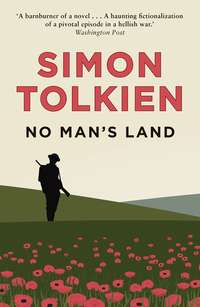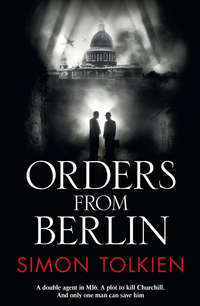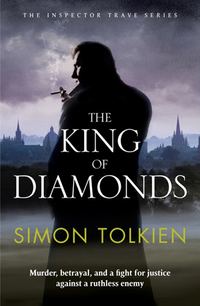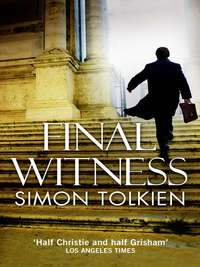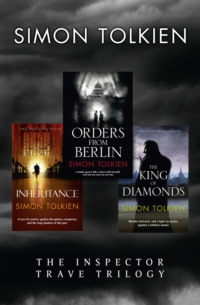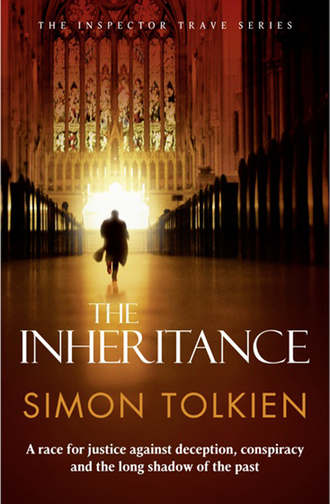
Полная версия
The Inheritance
‘What time did you arrive at Moreton Manor, Inspector?’ he asked, ‘on the night of the murder?’
‘Eleven forty-five.’ Trave spoke loudly, forgetting for a moment the acoustic qualities of the Old Bailey.
‘Were you the first policeman on the scene?’
‘No. Officers Clayton and Watts were already there. They’d got everyone in the drawing room. It’s across from the front hall.’
‘And the victim, Professor Cade – he was in his study. On the ground floor of the east wing.’
‘Yes. That’s right,’ said Trave.
There was a measured coldness and determination in the way the prosecutor put his questions, which contrasted sharply with his remarkable lack of stature. Gerald Thompson couldn’t have been more than five feet tall. Now he took a deep breath and drew himself up to his full short height as if to underline to the jury the importance of his next question.
‘Now, tell us, Inspector. What did you find?’
‘In the study?’
‘Yes. In the study.’
Trave could hear the impatience in the prosecutor’s voice, but he still hesitated before beginning his reply. It was the question he’d asked himself a thousand times or more during the four months that had passed since he’d first seen the dead man, sitting bolt upright in his high-backed armchair, gazing out over a game of chess into nothing at all. Shot in the head. Detective Inspector Trave knew what he’d found, all right. He just didn’t know what it meant. Not in his bones, not where it mattered. Pieces of the jigsaw fit too well, and others didn’t fit at all. Everything pointed to Stephen Cade as the murderer, but why had he called out for help after killing his father? Why had he waited to open the door to his accusers? Why had he not tried to escape? Trave remembered how Stephen had gripped the table at the end of their last interview in Oxford Police Station, shouting over and over again until he was hoarse: ‘I didn’t do it, I tell you. I didn’t kill him. I hated my father, but that doesn’t make me a murderer.’
Trave had got up and left the room, told the sergeant at the desk to charge the boy with murder, and walked out into the night. And he hadn’t slept properly ever since.
Thompson, of course, had no such doubts. Trave remembered the first thing the prosecution counsel had told him when the case was being prepared for trial: ‘There’s something you should know about me, Inspector,’ he’d said in that nasal bullying tone with which Trave had now become so familiar. ‘I don’t suffer fools gladly. I never have and I never will.’
And Trave was a fool. Thompson hadn’t taken long to form that opinion. The art of prosecution was about following the straight and narrow, keeping to the path through the woods until you got to the hanging tree on the other side. Defence lawyers spent their time trying to sidetrack witnesses and throw smoke in the jurors’ eyes to keep them from the truth. Trave was the officer in the case. It was his duty not to be sidetracked, to keep his language plain and simple, to help the jury do its job. And here he was: hesitant and uncertain before he’d even begun.
Thompson cleared his throat and glowered at his witness.
‘Tell us about the deceased, Inspector Trave,’ he demanded. ‘Tell us what you found.’
‘He’d been shot in the head.’
‘How many times?’
‘Once.’
‘Where in the head?’
‘In the forehead.’
‘Did you find the gun?’
‘Yes, it was on a side table, with a silencer attached. The defendant said he’d put it there after picking it up from the floor near the French windows, when he came back into the study from the courtyard.’
‘That was the story he told you?’
‘Yes, I interviewed him the next day at the police station.
‘His fingerprints were on the gun. That’s right, isn’t it?’
‘Yes.’
‘And on the key that he admitted he turned in order to unlock the door into the corridor. The defendant told you that as well in his interview, didn’t he, Inspector?’
‘Yes. He said the door was locked and so he opened it to let Mr Ritter into the study.’
‘Tell us who Mr Ritter is.’
‘He was a friend of Professor Cade’s. They fought together in the war. He and his wife had been living at the manor house for about seven years, as I understand it. Mrs Ritter acted as the housekeeper. They had the bedroom above the professor’s study, overlooking the main courtyard.’
‘Thank you, Inspector. All the fingerprint evidence is agreed, my lord.’
‘I’m glad to hear it,’ said the judge, in a tone that suggested he’d have had a great deal to say if it hadn’t been. His Honour Judge Murdoch looked furious already, Thompson noted with approval. Strands of grey hair stuck out at different angles from under his old horsehair wig, and his wrinkled cheeks shone even redder than usual. They were the legacy of a lifetime of excessive drinking, which had done nothing to improve the judge’s temper. Defendants, as he saw it, were guilty and needed to be punished. Especially this one. People like Stephen Cade’s father had fought in two world wars to defend their country. And for what? To see their sons rebel, take drugs, behave indecently in public places. Stephen Cade had made a mistake not cutting his hair for the trial. Judge Murdoch stared at him across the well of the court and decided that he’d never seen a criminal more deserving of the ultimate punishment. The little bastard had killed his father for money. There was no worse crime than that. He’d hang. But first he’d have his trial. A fair trial. Judge Murdoch would see to that.
‘Let’s stay with the interview for a little bit longer,’ said Gerald Thompson, taking up a file from the table in front of him. ‘You have it in front of you, if you need to refer to it, Inspector. It’s an agreed version. The defendant told you, did he not, that he’d been arguing with his father shortly before he found Professor Cade murdered?’
‘Yes. He said that he went to the study at ten o’clock and that he and his father played chess and argued.’
‘Argued about his father’s will? About his father’s intention to change that will and disinherit the defendant?’
‘Yes. The defendant told me they talked about the will but that their main argument was over the defendant’s need for money.’
‘Which his father was reluctant to give him.’
‘Yes …’
Trave seemed to want to answer more fully, but Thompson gave him no opportunity. ‘The defendant told you in interview that he became very angry with his father. Isn’t that right, Inspector?’ asked the prosecutor.
‘Yes.’
‘The defendant admitted to shouting at Professor Cade that he deserved to die.’ The pace of Thompson’s questioning continued to pick up speed.
‘Yes.’
‘And then he told you that he left the study and went for a walk. That’s what he said, wasn’t it, Inspector?’
Thompson asked the question in a rhetorical tone that made it quite clear what he, at least, thought of Stephen Cade’s alibi.
‘He said he walked up to the main gate and came back to the study about five minutes later, when he found his father murdered.’
‘Yes. Now, Inspector, did you find any footprints to support Stephen Cade’s account?’
‘No. But I wouldn’t have expected to. The courtyard is stone and the drive is Tarmac.’
‘All right. Let me ask you this, then. Did you find any witnesses to back up his story?’
‘No. No, I didn’t.’
‘Thank you. Now one last question,’ said Thompson, smiling as if he felt he’d saved his best for last. ‘Did you find any of the defendant’s belongings in the study?’
‘We found his hat and coat.’
‘Ah, yes. Where were they?’
‘On a chair beside Professor Cade’s desk.’
‘And the professor himself. Where was his body in relation to this chair and in relation to the entrance doors to the room? Can you help us with that, Inspector?’
‘Why don’t you give the jury a chance to look at all this on the floor plan, Mr Thompson?’ said the judge, interrupting. ‘It might make it clearer.’
‘Yes, my lord, I should have thought of that. Members of the jury, if you look at the plan, you can see the courtyard is enclosed on three sides by the main part of the house and its two wings. Professor Cade’s study is the last room on the ground floor of the east wing. It faces into the courtyard, and you can see the French windows marked. The internal door in the corner of the room opens out into a corridor which runs the length of the east wing. You can take it up from there, Inspector,’ said Thompson, turning back to his witness.
‘Yes. The deceased was seated in one of the two armchairs positioned in the centre of the study, about midway between the two entrances,’ said Trave, holding up the plan. ‘The desk and the chair with the defendant’s hat and coat were further into the room.’
‘So the professor was between the doors and the defendant’s hat and coat?’
‘Yes. That’s right.’
‘Thank you, Inspector. That’s what I wanted to know. No more questions.’
Thompson sat down with a self-satisfied expression on his face and stole a glance at the jury. He knew what the jurors must be asking themselves: Why would Stephen Cade have gone for a walk at half past ten at night? And if he did, why didn’t he take his hat and coat? It was obvious he hadn’t been wearing them, because not even he could pretend that he put them back on the other side of his dead father’s body on his return.
No, the truth was inescapable. Stephen Cade never went for any walk at all. He was in the study the whole time, arguing with his father about his will, threatening him, and finally killing him with a pistol that he had brought along for that precise purpose.
Then, the next day, he’d told the police a ridiculous story in order to try to save himself. But it wouldn’t wash. With a little help from the prosecution, the jury would see right through it. It’d find him guilty, and then Judge Murdoch would make him pay for what he’d done. With his neck.
CHAPTER 2
That same evening, after court, Stephen Cade’s girlfriend, Mary Martin, came to visit him in Wandsworth Prison.
Sitting in the car in the early October twilight, she blocked out her companion and his anger and focused instead on the prison walls, which reared up high, black, and imposing at the end of the side street of terraced Victorian houses on which they’d parked a few minutes before.
Beside her, Paul kept his eyes half-closed and his breath came slowly, as if he was visibly trying to calm himself after his outburst moments earlier. But the grip of his hands on the steering wheel hadn’t relaxed and the whites of his knuckles showed through. Yet Mary remained impervious, her mind concentrated on preparing for the ordeal ahead. The first day of the trial was always going to be stressful, and the prison intimidated her for some reason – more each time she came. But that only increased her resolve to go through with the visit. She’d promised, and she wasn’t one to break her word, however much Paul pressed her to stay away.
Pulling down the mirror in the sun visor above the dashboard, she inspected herself closely. She was wearing no jewellery or cosmetics, but she didn’t need to. She had good, regular features, yet there was more to her face than just that. The fullness of her lips and the curves of her figure spoke of a sensuality that was half-belied by something watchful, almost withdrawn in her eyes. It made her mysterious and somehow challenging, and at times it almost made her beautiful.
Mary knew this, but the knowledge gave her no particular pleasure. She was a person entirely without vanity. Her pretty face was an asset to be exploited in her career. Nothing more. It got her better parts than plainer girls could hope for. And for that she was grateful. She certainly had no wish to be a poor actress. The life was difficult enough without being unsuccessful.
Satisfied with her appearance, Mary ran her hand through her thick chestnut-brown hair one last time, took a deep breath, and opened the door of the car. It was cold outside and she walked away quickly without a word to Paul or even a backward glance.
Inside the prison Mary waited with the other visitors in a whitewashed room dimly lit by a dusty tube of fluorescent lighting that flickered overhead as if it was just about to give up the ghost. All the walls were decorated with poorly typed notices about what could not be brought into the prison and what could not be taken out, and the biggest sign over on the far wall listed the penalties for assisting a prisoner to escape. Underneath it a young mother with an old face was trying to calm a screaming undernourished baby, while a warder sat behind a metal desk near the door reading a tabloid newspaper with his blue cap tipped down over his wide forehead.
Time passed slowly, and Mary counted out the minutes on the old black institutional clock hanging above the warder’s head. One, two, three, four, five, until exactly half past six when an invisible bell rang and everyone got to their feet, shuffling out into the main courtyard of the prison. It was almost dark now and Mary stayed at the back, following behind two local South London women who seemed to know each other well.
‘That’s where it happens. That’s where they do it. Florrie told me when I was last here,’ said one, adopting a theatrical stage whisper as she pointed excitedly over towards a two-storey red-brick building close to the west side of the perimeter wall. Its ordinariness was what made it noticeable. That and the lack of windows. There was only one, high up near the roof.
The unit, as it was known, was approached through a door in a wire fence, to which had been affixed a prominent ‘No Entry’ notice. The instruction did not seem necessary. Everyone in the courtyard, prisoners and warders alike, seemed to instinctively avoid going anywhere near the death house.
‘I know all about it. I’ve been here a lot more times than you, you know,’ said the other woman irritably. ‘I’ve seen them putting up the notices on the prison door in the early morning, and I’ve watched the families waiting outside, which is more than you have, Ethel. Huddled up in their cars in the cold. Some days they don’t let us in when there’s been a hanging. The prisoners get restless and the screws can’t control them properly. My Johnny’s told me what happens.’
‘Is that when they do it then? At dawn?’ asked Ethel, who was obviously used to accepting her friend’s sharp words without complaint.
‘No. It’s usually seven or eight o’clock in the morning, after the poor sod’s been nicely softened up by a night in the death cell, vomiting up his last meal if he was stupid enough to eat it in the first place. And stop bloody talking about it, Ethel. People don’t do that in here. You should know that.’
Ethel was silenced, and the two women covered the rest of the walk to the visitors’ block in silence, leaving Mary alone with her thoughts. She had known, of course, that they carried out executions here, but she had successfully managed to avoid identifying the actual place where it happened during her previous visits. She’d somehow assumed that it would be out of sight, but now she knew better. Ethel and her friend had seen to that, and Mary accepted the knowledge like an obligation.
At the door to the visits hall she paused, blinking in the sudden bright artificial glare of the overhead lights. There were no dark corners here where contraband could be passed across, under, or around the wooden tables, which were ranged in long rows from one end of the hall to the other. And along each wall warders in blue serge uniforms stood watching, occasionally stepping forward to enforce the rules forbidding any form of physical contact between inmates and outsiders.
Waiting in line for her pass to be checked at the front desk, Mary thought that the ceaseless unified drone of all the voices in the hall made the place seem like a vast beehive, but then she realized the comparison was far from apt. There was nothing productive happening here, and for most of the people in the room the short time together only made the subsequent separation from their loved ones even harder to bear. In the grip of a sudden claustrophobia, Mary half-wished she hadn’t come.
Directed to a table at the far end of the hall, Mary caught sight of Stephen before he saw her. His bright blue eyes were wide open but clearly unfocused on his present surroundings. Always the dreamer, she thought as she walked towards him down the aisle.
He had changed out of the suit he’d worn for court into the standard-issue prison uniform of blue-and-white-striped shirt and jeans, and he was now sitting in a characteristic pose: his elbows resting on the table, his head resting on his hands, and his long, tapering fingers interlaced as if in prayer, while his thumbs rhythmically caressed his Adam’s apple and the stubble on the underside of his chin. The top of his shirt was open, exposing the whiteness of his throat, and Mary suddenly stopped in her tracks, fighting to hold back images of the executioner fitting a noose around her lover’s neck, of the snap as the trapdoor opened beneath his feet, of Stephen hanging in the air, twisting and turning this way and that. All trussed up and dead. Everything around her suddenly seemed too real, too brightly lit, and she steadied herself for a moment against an empty chair.
I shouldn’t have listened to those bloody women, she thought as she caught Stephen’s eye and drew the outline of a smile across her suddenly pale face.
But for Stephen there was no effort. His face lit up as soon as he saw her. And the sudden glow transformed his features. The stubborn line that sometimes seemed fixed around his mouth disappeared in the radiance of his smile as he got up to pull out the chair on the other side of his table and instinctively brushed it down with a prison-issue handkerchief extracted from the pocket of his trousers.
‘Quite the gentleman,’ said Mary.
‘It’s the training,’ said Stephen. ‘English public schools, dinner parties at home, you know.’
‘Not exactly the ideal preparation for life inside this place,’ she said, looking around her at the lines of broken-down men in their ill-fitting prison uniforms. Stephen’s, surprisingly, fitted him quite well. He seemed to have the knack of making any clothes he wore seem like they were tailor-made.
‘Well, that’s where you’re wrong,’ he said, smiling. ‘My school had a lot in common with prison as a matter of fact. Lousy food, endless rules and regulations, an all-male population thinking about what they can’t have. And a whole lot of men in uniforms making sure they don’t get it.’
‘Don’t be ridiculous,’ said Mary, laughing. ‘This is Wandsworth Prison, for God’s sake.’
‘True. And I’m sorry. I’m not thinking as usual. I hate you having to come here. It’s a horrible place. I wish they’d let me see you at court.’
Instinctively Stephen stretched out his fingers and touched the top of Mary’s hand for a moment. She looked up into his eyes for the first time since her arrival and thought how strange it was that he should be so concerned for her welfare when he was the one shut up inside this God-forsaken place, on trial for his life. He’d changed since Oxford, she realized. He wasn’t a boy any more; prison had made him a man.
‘Kissing’s not allowed, I’m afraid,’ he said, holding her gaze. ‘Strictly against the rules.’
Mary could understand why. She could hardly fail to have noticed the lust in many of the prisoners’ eyes when she’d walked past them. Sexual frustration hung in the air like a cloud of atmospheric pressure.
‘You looked good in court today,’ she said. ‘I liked the suit.’
‘I’m glad. Can’t say I did much. Made me feel like I was going to my own funeral.’
They were silent for a moment, both back in the courtroom with the dwarflike prosecutor relentlessly outlining the evidence against the accused.
‘You mustn’t worry, you know,’ he said, as if reading her thoughts. ‘I’ll be all right. Truth will out, you’ll see. Old Murder can do his damnedest, but it’s not his decision at the end of the day.’
‘Old Murder?’
‘Oh, sorry – that’s what they call our judge in here. They say he’s the worst of the lot. But the nickname’s pretty good, don’t you think? He looked at me today like he’d got half a mind to come down off his bench and throttle me himself. God knows why. It’s not like he even knows me.’
Stephen fell silent, as if frightened at how doubt had so quickly replaced his earlier optimism. But then his lips tightened in defiance. ‘I didn’t do it, you know,’ he said suddenly. ‘I couldn’t have killed him even if I’d wanted to. He was my father, for Christ’s sake. It’d be like murdering part of myself.’
‘You said you hated him,’ she said.
‘Yes. And I loved him too. Love and hate aren’t so far apart, you know.’
Stephen was silent again for a moment, and there was a faraway look in his eyes when he went on: ‘There’s not a day goes by that I don’t feel guilty about leaving him alone that night. Opening the door for whoever it was to walk straight in there and put a bullet through his head.’
‘How were you to know?’
‘I wasn’t. I just wish I hadn’t left him, that’s all. No one deserves to die like that.’
‘What about that family in France?’ asked Mary, leaning forward across the table. ‘He herded them into a church like cattle. That’s what you told me. Did they deserve what happened to them?’
‘No, I know. You’re right. There are just too many ghosts. That’s the trouble. Too many unanswered questions,’ said Stephen, returning to the present with a half-forced smile. ‘Like who killed my father. My defence team doesn’t seem to be getting too far with that one unfortunately. And there’s not much I can do to help them while I’m sitting here.’
‘You’ve got to trust them,’ said Mary. ‘You’ve got a good barrister. Everyone says so.’
‘I know, I know. You’re right as usual. But enough about me. Tell me about yourself. Are you working?’
‘No, of course not. How could I come to court if I was acting as well? The stress is bad enough as it is.’
‘You’re right. It’s not easy.’
Mary bit her lip, unable to understand her irritation. What was she doing complaining about stress when Stephen was on trial for his life?
‘How’s your mother?’ asked Stephen, trying to keep up the conversation. ‘Is she any better?’
‘A little, maybe.’
‘I’m sorry. Have you been to see her again?’
‘Yes.’
‘And your brother. Did he go too?’
‘No. Yes. What do you want me to say? Why do you always keep asking me about Paul?’ asked Mary, irritated again.
‘Sorry,’ said Stephen defensively. ‘I guess it just felt a bit strange that you never wanted to introduce him to me. That’s all. It doesn’t matter now. Let’s talk about something else.’
But there was no time. A speaker on the wall crackled into life giving a two-minute warning. And it had the same effect as on Mary’s previous visits, pressurizing them both into an awkward silence.
‘I love you, Mary,’ said Stephen.
‘And I love you too,’ she replied.
But it was too pat. The place robbed their words of meaning. And there was no time left to explain, to connect, to try to work out where everything had gone wrong.
Mary got up to go. And afterwards, left on his own at the table, Stephen followed her with his eyes until she disappeared into the throng of other visitors leaving through the door at the back of the hall. And involuntarily he wondered whether she would be driving away from the prison alone or whether there would be someone waiting to meet her on the other side of the high wall surmounted with barbed wire that separated him so entirely from the life he’d left behind.
CHAPTER 3
In court the next morning, Gerald Thompson watched his opposite number get slowly to his feet. John Swift was a tall, willowy, good-looking man in his late forties. He’d been a pilot in the war, one of those who’d led a charmed life, guiding his Spitfire through everything the Germans and later the Japanese had been able to throw at him without once being shot down. Things came easily to him. As a barrister, he had an instinctive ability to see what mattered, to find what was persuasive in a case and get it across to a jury in a way that they could understand. Except in this case. Here, everything seemed to point towards the defendant’s guilt, and on top of that Stephen Cade was his own worst enemy. He was headstrong and unmalleable. And his interview with the police was a disaster.


